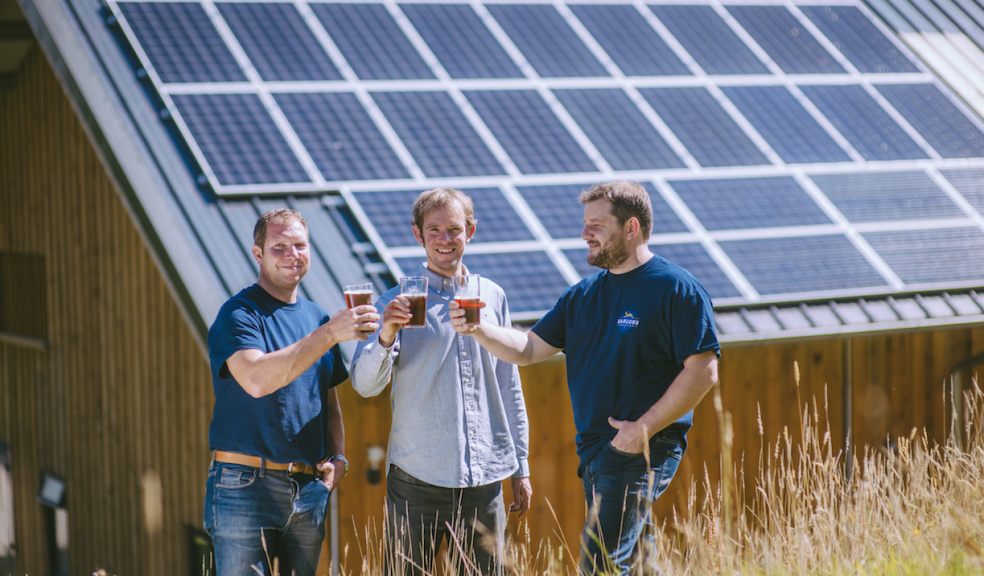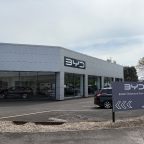
Solar panels bring light to Devon Darkness
It may be just 20 months since Devon family brewery Hanlons opened its new facility, but it’s already delivering on its promise to source as much of its ingredients as possible from the local area – and that includes the electricity used to brew its Devon Darkness ale, which will be launched this winter.
After starting production of its award-winning ales using water from the borehole on its farm in Half Moon Village, near Exeter, it’s next ‘green’ step forward has been to generate the electricity to power its machinery from a tailored-made solar PV system on the brewery’s roof.
“It all goes back to when we started planning the building,” said Dan Taylor, Director of Hanlons Brewery, whose family also own the farm where the brewery is built. “We were determined to do all that we could to minimise our environmental impact, so – in addition to using water from our own borehole and keeping mileage to a minimum – we specified that our building should have a pitched roof in order to easily install solar panels in the future.”
Hanlons contacted Exeter-based SunGift Energy, which is the most recommended solar installer in the UK*, for advice. “This turned out to be an excellent decision,” added Dan. “SunGift convinced us to wait until they had fully monitored and analysed our energy-usage patterns in order to match our solar system to our specific requirements. The result is that we use almost all of the energy our system generates, without needing to feed much electricity back to the grid.”
Hanlons’ situation was particularly tricky because – like many businesses – their district network operator company (Western Power Distribution) restricts the amount of energy that the company is allowed to feed back to the grid. By closely analysing the ‘peaks and troughs’ of Hanlons’ energy needs, SunGift was able to help the company decide on the ideal system that would suit its needs.
“Environmental considerations are very important to us,” added Dan. “And from a business perspective it’s also very important that we do not waste any electricity that we generate. We originally thought that a 50 kW system would be the best solution for us, but as SunGift’s detailed analysis showed that a 30 kW system would better suit our needs and result in less waste that’s what we settled on.”
SunGift’s head designer Oliver Grogono began by discussing Hanlons’ requirements with them before carrying out a full site survey and setting up a sophisticated energy monitoring system, which pinpointed exactly how much energy Hanlons was using at various different times. SunGift then provided Hanlons with a full set of analytics, specifying the ideal panels and inverters for their needs.
The company’s east/west-facing building, combined with it’s steady energy usage throughout the day meant that it was ideally suited to having panels installed on both of its roofs. It’s panels now generate electricity to power the brewery’s pumps, heaters, coolers, lights, bar, kitchen and offices.
“Solar systems work to their optimum when they match a business’s exact requirements,” said Oliver Grogono. “We closely monitored their energy-usage patterns, daily peaks and any other issues. The detailed modelling and upfront hard work has certainly paid dividends, as it takes out the guesswork and means that Hanlons now has a tailor-made solar PV system.
“Delaying the installation and taking our time to get things right meant that we could really look after Hanlons’ interests. We were able to calculate that a bigger system would actually have been less financially attractive due to the grid constraints.”
In addition to powering the brewery’s machinery, the solar panels also provide electricity for Hanlons’ bar and kitchen, which host office meetings, business lunches, private parties, and Friday-evening social gatherings.
“SunGift did an exceptional job from start to finish, and I was impressed with their staff’s manner and professionalism” added Dan Taylor. “They made sure that we received the correct size and specification of system for our precise needs without losing any of the energy that we generate.”




















